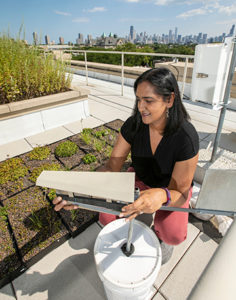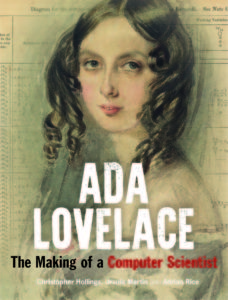Ada Lovelace Day is teaming up with ecologists from the University of York and DePaul University in Chicago, USA, to run an international ecology workshop and to create a long-lasting and robust professional network amongst participants, who will be drawn predominantly from groups and countries generally underrepresented in STEM.
The collaboration has been awarded a £80,177 grant by the Natural Environment Research Council (NERC) to run the project, which will study fungi essential to soil health as well as promoting inclusivity and the retention of women and minorities in science.
Innovative investigation into crucial fungi

Dr Bala Chaudhary on a green roof experiment in Chicago, installing a spore trap to measure fungal spore dispersal.
An international workshop in York in the summer of 2019 will bring together ecologists from around the world to design a spore trap to be used in locations across the globe to collect samples and shed some light on the airborne dispersal of mycorrhizal fungi spores. Participants will co-design the trap itself, the data collection methods, and implementation, leading to the development of a dynamic, predictive model of mycorrhizal fungi distribution and dispersal networks.
Mycorrhizal fungi are essential to soil health, playing a major role in soil quality, plants’ nutrient and water uptake, as well as protecting them from pests and pathogens. By investigating the dispersal rates of these spores, we can better understand if and how these fungi spread from area to area – the first step to rebuilding resilience in soils that have degraded due to environmental change, and subsequently strengthening food production and security.
Global network to support women and minorities
With support from universities on five continents, the project will also develop participants’ cross-timezone collaboration and professional networking skills to create a sustainable and truly global community. It will particularly focus on recruiting scientists who are diverse in gender, race, geography and culture with support for those from low and middle income countries.
The project will be led by York’s Dr Thorunn Helgason, Senior Lecturer in Ecology, alongside Dr Pen Holland, Lecturer in Ecology. Project partners will include Dr V Bala Chaudhary, Assistant Professor in Environmental Science and Studies at DePaul University and Suw Charman-Anderson, founder of Ada Lovelace Day, an annual international celebration of the achievements of women in STEM.
